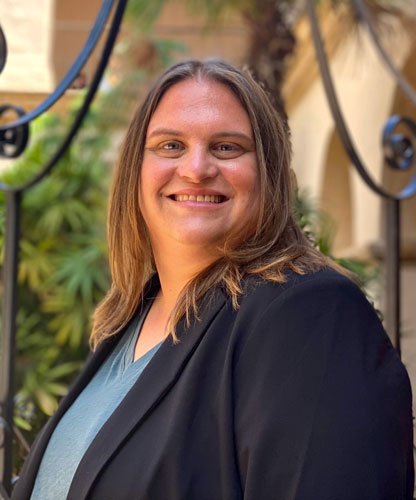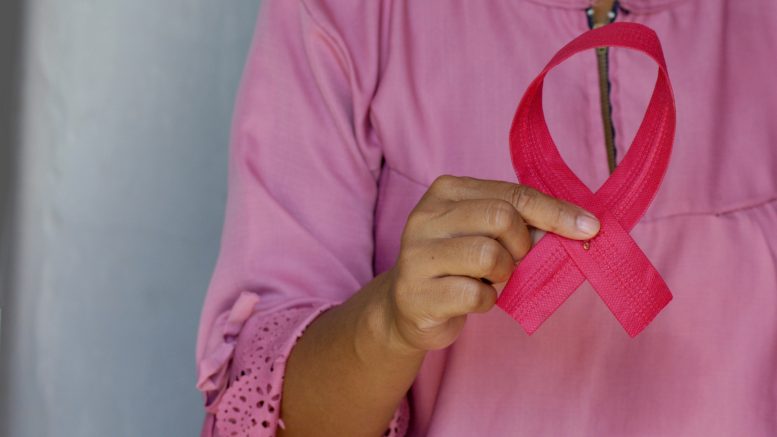By Courtney Quinn

At the age of 37, my life took an unexpected turn. I felt what I thought was a bruise from our dogs on my left breast. A doctor’s exam and mammogram led to a diagnosis that would change everything: breast cancer. Fear and anxiety followed me every step of the way, through my double lumpectomy, chemotherapy, radiation, hormone therapy, and what feels like nonstop doctor appointments. It wasn’t until I replaced my fear with facts that I began to feel empowered and no longer at the mercy of this disease.
For many, the word “cancer” paints a picture of despair and death, but it doesn’t have to be that way. Cancer is not always a death sentence. It’s about education, self-advocacy, and early detection when the disease is most treatable.
I’m a living testament to the power of early detection. Had I not been vigilant about my health and advocated for myself even when I was considered “too young” for a recommended breast cancer screening, my story might have taken a darker turn. I was fortunate to have access to the necessary treatments and support to fight back.
Unfortunately, not all 193,880 Californians diagnosed with cancer this year will have equal access to compassionate support and resources.
The growing number of racial and ethnic minorities in California, those in the LGBTQ+ community, as well as those from low-income backgrounds face barriers to accessing timely and quality health care. They are also less likely to stay up to date with the five current recommended cancer screenings for breast, cervical, prostate, colorectal, and lung cancer. Now, with the development of cutting-edge technologies for early detection, we can reach even more people and increase their chances of overcoming the disease.
Multi-cancer early detection tests (MCED) can detect multiple cancer types, in the tissue of origin, and, in some cases, before any signs or symptoms may appear. This is a game changer, but only if those who need it most have access.
I urge Congress to do everything they can to pass the Nancy Gardner Sewell Medicare Multi-Cancer Early Detection Screening Coverage Act (H.R. 2407) this year.By enabling Medicare to create a coverage pathway for MCED tests once they are approved by the U.S. Food and Drug Administration for widespread clinical use, H.R. 2407 will help close the gap in cancer care and improve equitable access to the latest technologies and advancements in cancer care. Without this legislation, Medicare could very well delay coverage for years or even decades – time that the 6.6 million Californians enrolled in Medicare cannot afford to lose.
Those who question the value of MCED tests and early detection argue that early detection does not equate to prevention, costs are too high, and improved survival rates are merely “statistical artifact(s).” Such arguments overlook the harsh reality faced by those whose cancer is diagnosed at an advanced stage, including limited and aggressive treatment options, uncertain prognoses, and the profound emotional and physical turmoil.
Early detection means more time with our loved ones, more milestones to reach, and memories to make. As a survivor, this is invaluable and justifies every expense. And while I agree, prevention is better than early detection, there is currently no single cause for cancer or a foolproof way to prevent it. Factors such as genetics, environment, age, and lifestyle all play a roll. However, nothing can take away from the fact that giving individuals a chance to detect cancer at an early, more treatable stage leads to less invasive and less expensive treatment options.
Now that we have these tools at our disposal, lawmakers must act to accelerate our progress in defeating cancer. MCED tests may not be a cancer cure that we all want, but they absolutely will get us closer to a future where cancer is no longer synonymous with despair, but rather with resilience.
Courtney Quinn is a cancer survivor and patient advocate currently serving as the Executive Director of Albie Aware Breast Cancer Foundation


Be the first to comment on "Essay: Surviving cancer isn’t luck– it’s early detection and advocacy"